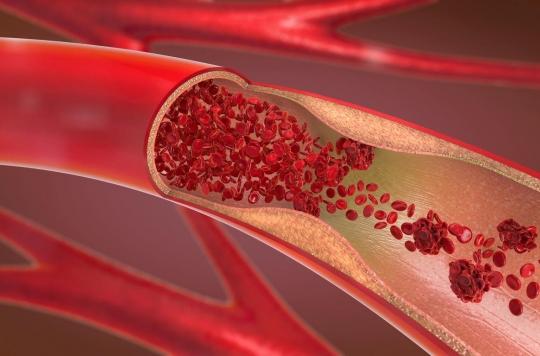More and more doctors are observing blood clots in their patients with Covid-19 and in critical condition.

- Abnormal coagulations have been observed in Covid-19 patients
- It can cause heart attacks and strokes
- The causes of this phenomenon remain unknown except that the formation of clots sometimes accompanies acute diseases
We discover a little more every day about the dark consequences of the new coronavirus. Originally perceived as a virulent respiratory disease, it turned out that the disease could also affect other organs such as the kidneys. Recently, researchers realized that SARS-CoV-2 could cause clots to form in the blood vessels of patients. According to a Dutch study published on April 10 in the journal Thrombosis Research, among 184 patients with Covid-19 in an intensive care unit, 38% had abnormally clotting blood. This phenomenon has also been described by many American doctors, by opening the lungs of deceased Covid-19 patients, where tiny clots have been found.
However, clots in the blood vessels can have dramatic consequences. When they form in the veins of the leg, they can travel up to the lungs, block the arteries there and cause a pulmonary embolism. In the heart, they can lead to a heart attack, and in the brain, to a stroke. Around the world, more and more doctors are seeing these cases in their patients with Covid-19. For Dr. Jeanne Marrazzo, professor of infectious diseases at the University of Alabama in Birmingham (United States), micro-clots could also be responsible for one of the unique symptoms of Covid-19: the sudden loss of blood. ‘smell.
In the United States, doctors first noticed abnormalities in their patients’ legs, which turned blue and swelled. Several American intensive care units have seen many similar cases at the same time. A phenomenon so violent that dialysis machines used to filter impurities in the blood when the kidneys were failing found themselves blocked several times a day by these clots.
“We are scared”
At NYU Langone (New York City, United States), doctor Shari Brosnahan, a lung specialist, is currently monitoring two forties in intensive care. One of them risks losing a hand, and the other, all four limbs. The number of cases where clots go up in the veins has more than doubled since the start of the epidemic in patients in critical condition, she worries to AFP.
Every year, doctors treat patients with coagulation-related complications and “they don’t coagulate like that”, alarmed Doctor Lewis Kaplan, a doctor from the University of Pennsylvania and director of the American Society of Critical Care Medicine. “The problem we have is that while we understand there is a clot, we still don’t understand why there is a clot. We do not know. And so, we are afraid”, he explains to Washington Post.
Usually blood thinners like heparin are given for clots. However, this does not always work and sometimes leads to internal bleeding, because often the clots caused by SARS-CoV-2 are micro-clots that form even in the capillaries, the smallest blood vessels. In which case, it is impossible to operate and amputation is often the only solution.
This formation of micro-clots could also sometimes explain why artificial respirators are sometimes ineffective. Indeed, when they form in the lungs, the blood cannot circulate there and goes back into the body without being oxygenated.
Several hypotheses have been put forward
Researchers are therefore now working to understand why and how the virus would cause this coagulation. This could be explained because many critically ill patients suffer from cardiovascular or pulmonary antecedents. Another hypothesis suggests that the clots are a consequence of the inflammatory outbreak associated with the disease.
“One theory is that once the body is so engaged in a fight against an invader, the body begins to consume the clotting factors, which can lead to either blood clots or bleeding. In the case of Ebola, the balance was rather in favor of bleeding. In the Covid-19, it’s more blood clots”, advance in particular Harlan Krumholz, cardiologist at the Yale-New Haven Hospital Center, (United States).
Nevertheless, “any acute disease, in itself, predisposes to the creation of clots”, nuance Behnood Bikdeli, specialist in internal medicine at the Columbia University Medical Center (United States), interviewed by AFP. Furthermore, “viruses often do strange thingscomments Shari Brosnahan. We’re just discovering the weird things this virus does.” Finally, if the diversity of complications linked to Covid-19 makes you dizzy, research on this new virus is only in its infancy. “It is possible that everything is caused by a single thing, and that a single solution exists”concludes Shari Brosnahan.

.

















